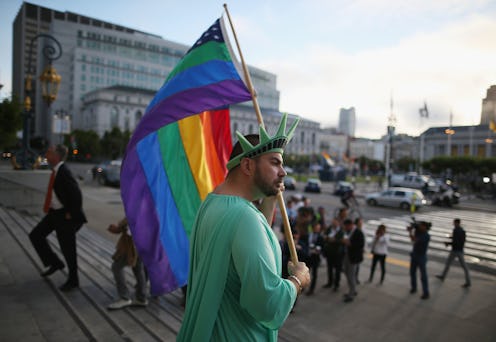News
Your New Favorite Activist Tee Shirt
LGBT activists are putting renewed pressure on the International Olympic Committee (IOC) to make sure that the upcoming 2014 games in Sochi, Russia will be a safe place for gay athletes and allies. On Saturday, Russian activists met with IOC President Thomas Bach to ask for an investigation into a Russian law passed in June which bans "gay propaganda." The law bans “propaganda of nontraditional sexual relations among minors,” which could even include PDA between gay partners. The law has been widely decried by activists and allies as anti-gay, and has lead to calls to boycott the Olympic games.
"Some countries ... think that there is no need to protect children from this. We do. We are not going to interfere,” Russian President Vladmir Putin said. “But we are going to provide such protection the way that State Duma lawmakers have decided.” Putin claims that all people will be welcome at the Olympic games (although he's also said there's "no gay discrimination" in Russia, so...).
The IOC has previously said it is fine with Russia's anti-gay law. "The IOC doesn't have the right to discuss the laws that are in place in the country hosting the games, so unless the charter is violated we are fully satisfied,” Chairman of the IOC Coordination Commission Jean-Claude Killy said, adding that the members of the commission had debated the issue with each other for several days.
But over the weekend, leaders from various organizations, including All Out, asked the IOC to look into the law again, which they say violates the Olympic's sixth principle of inclusion.
"If the IOC and Russian officials were serious about making the Games open to all, they would take action before Sochi to reject laws that are leading to a dramatic spiral of brutal violence against gays and lesbians," All Out Co-founder and President Andre Banks said.
Since the law was passed, activists say, there's been an increase in anti-gay violence in Russia.
"The environment is becoming increasingly hostile, with private meetings broken into, gay clubs attacked and various homophobic groups calling for violence against LGBT people," said Anastasia Smirnova, a spokeswoman for several LGBT groups in Russia.
Some are comparing the IOC's stance on Sochi to the 1936 Olympics, when the Olympic committee chose Berlin to host the summer Olympics ... despite a certain Nazi government. It's a "matter of domestic policy," the IOC said at the time. History, man.
Either way, this year's Olympics are sure to be full of demonstrations — even if Putin is trying to ban those too. (As well as this bizarre list of things.)
Of course, there are already tee shirts. Principle6 and American Apparel's new line of shirts, based on the Olympic charter's sixth principle of inclusion, highlights the phrase "or otherwise" on the charter's list of ways the games shouldn't discriminate against people. (Principle6 is an organization comprised of various LGBT rights groups which is calling for an end to discrimination at the games.)
“Perhaps the state authorities should have waited a little to include the ban on homosexuality propaganda in the law,” Sports Minister Vitaly Mutko recently conceded. “It was possible to calculate how much resonance it would cause in the West, especially in the run-up to the Sochi Olympics."
But the Russia's official in charge of Human Rights and the Rule of Law, Konstantin Dolglov, has maintained the anti-gay propaganda law is not discriminatory. “It is not violating any of Russia’s obligations in the international sphere," Dolglov said. "The only thing banned by this act is the aggressive imposing of non-traditional sex-related ideas to the underage."
Earlier in November, a group of 11 U.S. senators met with the IOC to warn that the Olympics' reputation would be seriously damaged if there were any displays of intolerance.
(Image: Principle6.com)
